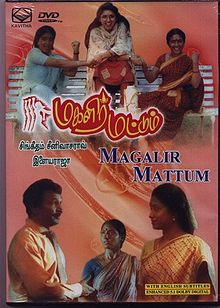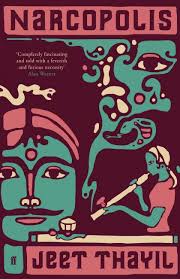by Vani Viswanathan
As a child, when I watched Magalir Mattum, I do distinctly remember being awed. A movie that was funny and led by women, each kick-ass in their own way. How clever these women were! When I watched it again recently, the one sentence that struck me as among the most wonderful, was Sathya telling her friends that she yelled at her manager for giving her a saree, just because she “didn’t like it.” There! The simplest, most straightforward things which if the world understood, would make it a wonderful place – the concept of consent, and the right of a woman to refuse.
All wasn’t great with that particular sequence I’m talking about, though, and I’ll tell you why shortly. Magalir Mattum (Only for Women) is a Tamil film that was released in 1994. Adapted heavily from an English comedy titled 9 to 5, Magalir…is the story of three women who ‘tame’ a sexist, womaniser boss who leaves no stone unturned when it comes to harassing a woman. The three women are as different as they can be, both in terms of character and background: one, Pappamma, is a cleaner, whose savings are being squandered by a drunk husband; Janaki would apparently be happier at home, if only she didn’t have to work after her husband lost his job; Sathya has studied ‘computers’ and smartly asks a potential groom whose family makes unreasonable dowry demands if they would mind if she tied the mangalsutra around his neck than the other way around. Sathya is clearly the leader of the pack, goading the other two into action; Janaki needs a push to be firm with her menacing colleagues, and Pappamma, bold as she is, needs to be brought into shape for their ‘revenge’ against the boss. The film really quickens pace when the three women ‘kidnap’ the boss when he asks them to spend a night with him. They tie him up to the ceiling, only leaving him enough rope to manoeuvre around like a cow. In the meantime, running the office in his absence, they make sweeping changes to the office, which predominantly employs women, bringing in daycare facilities, for instance. At the end of the movie, these changes are applauded by the MD, and the three women are appointed to take care of the establishment.
For a young girl only beginning to understand how sexism works, in whatever small portions it might have been, I can see why the movie appealed to me so then. After two years at an institute discussing varying aspects of feminist thought, though, there are a few things I wish the movie had addressed differently. When her boss gifts her a saree, Sathya tells him only a father or husband can gift a woman a saree, and since he’s neither, what he did was downright cheap. Watching it now, I cringe at the converse of the sister-mother argument at work here. Why couldn’t she simply have said it was none of his business, or better still, as she tells her friends later, that she simply didn’t like it? Why do daycare centres have to be only in the woman’s office, never the man’s? (No, I don’t want to get into the illogical discussion of whether women are more naturally suited to motherhood, etc.) There’s the question of ‘women’s only’ buses that pops up too (reflecting the movie’s title) – why should we pit ‘women’s only’ services as the way to counter sexism and harassment women face in the regular services? I agree that buses and train coaches reserved only for women go a long way in enabling many women, who might have otherwise been dissuaded, to access a wide variety of spaces. But is that the solution we should push for, given we’re only doing a band-aid treatment of the issue? And most annoyingly, why did the movie have to end with Sathya finding the elusive man whose face she has been building all along based on her ideas of beautiful eyes, nose, ears and lips? Is it that marriage is still the one key feature every woman craves for? Granted, Sathya doesn’t technically hate the concept of marriage, it’s the men she’s met who annoy her, but the fact that the movie ends on that note makes it seem like everything else she did was by-the-by!
Nevertheless, one thing that surprised and saddened me was that in the nearly-20 years since, I don’t think such a movie has really hit the screens. One that doesn’t focus on the woman as someone’s wife or girlfriend or mother, one where the woman doesn’t have to depend on a man to keep her job, one that celebrates the true spirit of a healthy friendship between women (yes, it’s possible!) For all the independent moviemaking and new talents that we are celebrating, the roles that women portray on screen are hardly representative of the wide variety of roles women play in life. And for that reason, even for the things I pointed out in the previous paragraph – and realising that such attitudes have still hardly changed – I still love the movie, and feel a thrill when I see Pappamma tackle the escaping boss to the ground, innocent Janaki delighting in taunting her boss, and Revathi pressing as if it were natural instinct a remote control button that pulls him off the ground and makes him hang from the ceiling. Oh, give me one more like this, Tamil cinema!
Vani Viswanathan is often lost in her world of books and A R Rahman, churning out lines in her head or humming a song. Her world is one of frivolity, optimism, quietude and general chilled-ness, where there is always place for outbursts of laughter, bouts of silence, chocolate, ice cream and lots of books and endless iTunes playlists from all over the world. She is now a CSR communications consultant, and has been blogging at http://chennaigalwrites.blogspot.com since 2005.







I love that movie too!! Thanks for this write up vani
This article brought back memories of watching and rewatching Magalir Mattum through school and realizing I had no other female-centric movies to compare it with. While it made for an awesome movie experience that they used comedy as a vehicle to convey a lot of their ideals, I wonder how it would have been if it was a “serious” movie.